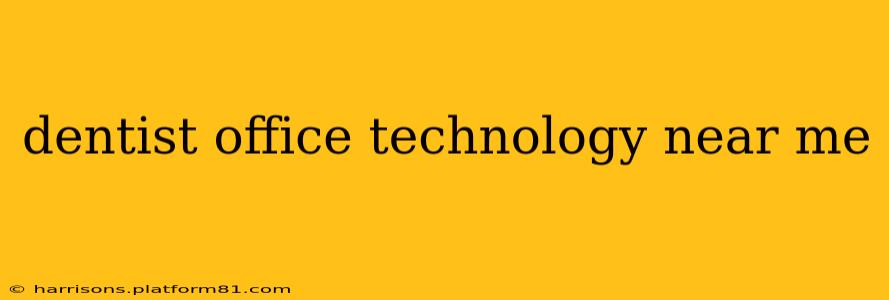Finding a dentist is one thing; finding a dentist who utilizes cutting-edge technology to enhance your care is another. Modern dental practices are incorporating a range of technological advancements to improve accuracy, comfort, and overall patient experience. This article will explore the types of technology you might find in a modern dental office near you, answering common questions about what to expect from a technologically advanced dental practice.
What are some examples of dental office technology?
Many dental offices near you are equipped with a suite of technological tools designed to improve diagnosis, treatment, and patient comfort. These can include:
-
Digital X-rays: These significantly reduce radiation exposure compared to traditional film x-rays, providing clearer, more detailed images for faster and more accurate diagnosis.
-
Intraoral Cameras: These tiny cameras allow dentists to show you real-time images of your teeth and gums, helping you understand your oral health better and fostering a more collaborative approach to treatment.
-
Cone Beam Computed Tomography (CBCT): CBCT scanners create three-dimensional images of your teeth, jawbone, and surrounding structures. This is particularly useful for complex procedures like dental implants, impacted wisdom teeth extractions, and orthodontics.
-
CAD/CAM Technology: Computer-aided design/computer-aided manufacturing (CAD/CAM) systems allow dentists to design and create crowns, veneers, and other restorations in-office, often in a single appointment, minimizing the need for multiple visits and temporary restorations.
-
Laser Dentistry: Lasers are increasingly used for various procedures, including cavity detection, gum treatments, and teeth whitening. They often offer less bleeding, faster healing, and increased precision.
How can I find a dentist with the latest technology?
Finding a dentist with advanced technology near you is easier than you might think. Start by:
-
Online Searches: Use specific keywords like "dentist with digital x-rays near me," or "dentist with CBCT scan [your city/zip code]." Look for websites and online reviews that highlight the technology used.
-
Check Reviews: Patient reviews often mention the technology used, providing valuable insights into the dentist's office. Look for mentions of specific technologies you're interested in.
-
Contact Dental Practices Directly: Don't hesitate to call dental offices and inquire directly about the technology they utilize. Ask specific questions about the equipment used for procedures you're considering.
What are the benefits of using modern dental technology?
The benefits of modern dental technology extend to both the dentist and the patient. For patients, this translates to:
-
Improved Accuracy: Advanced imaging and diagnostic tools lead to more precise diagnoses and treatment planning.
-
Increased Comfort: Procedures are often less invasive and more comfortable with technology like lasers and CAD/CAM.
-
Reduced Treatment Time: In-office CAD/CAM and other technologies can shorten the overall treatment time.
-
Better Aesthetic Outcomes: Technology contributes to more predictable and aesthetically pleasing results in cosmetic dentistry.
Does insurance cover technology-based dental procedures?
Insurance coverage varies widely depending on your plan and the specific procedures involved. It's crucial to contact your insurance provider directly to confirm coverage before undergoing any treatment. Many insurance plans cover standard dental x-rays and some basic procedures, but advanced technologies like CBCT scans may have additional costs or require pre-authorization.
What questions should I ask my dentist about technology?
When choosing a dentist, ask about their use of technology. Specifically, inquire about:
- Types of X-ray equipment: Are they using digital x-rays to minimize radiation exposure?
- Imaging capabilities: Do they offer intraoral cameras or CBCT scans?
- Restorative technology: Do they use CAD/CAM for restorations?
- Laser technology: Do they utilize lasers for any procedures?
By asking these questions, you can gain a clear understanding of the technological capabilities of your prospective dentist and choose the best fit for your needs. Remember, selecting a dentist who embraces the latest technology can significantly improve your overall dental experience and health outcomes.
